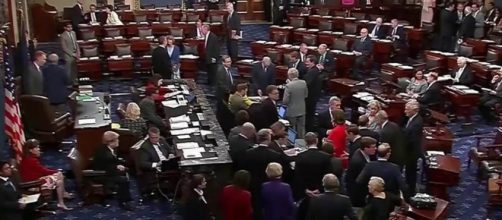At one time in American politics, republicans and democrats worked to find common ground in the U.S. Congress and Senate. Both parties were more moderate and reached across the aisle to work together, considered different options for solving America’s ills, and often came to a mutual agreement in the true spirit of compromise. But beginning with President Ronald Reagan, democrats started becoming more liberal and republicans became more right wing and their changing ideologies reflected that shift.
Years of partisan bickering and gridlock, along with a refusal to come together as a truly representative government, set the stage for Donald Trump and religious fundamentalists to take control of the executive, legislative, and judicial branches of the U.S.
government in the 2016 U.S. presidential election, although evangelical Christians had been quietly endorsing republicans in the background in growing numbers, beginning with the Reagan administration.
Partisan fighting drove most moderates into opting out of politics.
By the time republican George W. Bush declared his candidacy for president, the public had become little more than ideological pawns for right wing conservatives and liberals to use against each other. This was compounded when the two parties thrust social issues like abortion, civil rights, and LGBT rights into the forefront of the political battle, instead of leaving them with state and federal courts, or even the U.S. Supreme Court to address.
It quickly spilled over to include issues like public assistance, Social Security, poverty, and Medicare. Battle lines were drawn while the skyrocketing cost of a college education, health care, an aging population, and fewer high paying jobs as companies shifted their workforce to Asia, Mexico, and Central America were completely ignored.
The political shift was also reflected in budget battles with republicans wanting to cut social security and public assistance programs, while increasing student loan interest rates, and democrats wanting to increase spending for the same programs. The result was total gridlock in the U.S. Congress and U.S. Senate. Bi-partisan sub-committees were largely ignored by both parties.
Not one democrat or republican suggested working on solving the issues burdening taxpayers, and that the other things would work themselves out, for the most part.
Neither political party has tried to address underlying factors that created the issues plaguing America
American taxpayers are broke and can't afford conservative and liberal policies anymore. The tragedy is that there are things that could have been done in the past twenty-five years to minimize the need for social and other government programs and that would have put more money into taxpayer's pockets. Take the cost of a college education. The parties could have worked together to address the issue of college fees for things like computer labs and clubs that many students don't even use, or make colleges find alternatives to expensive textbooks that are only used one or two semesters.
Recently, at Wichita State University, in Wichita, KS, it was announced that students would be charged a membership fee at the new YMCA on campus even if they don't use the facility. Similar charges and fees are levied on students attending every two or four-year institution of higher learning.
The middle class can no longer afford the right wing or liberal agendas
As the income base has eroded with the shift to a service economy resulting in lower pay, fewer benefits, and no health insurance, families are struggling economically. Throw in the escalating costs of utilities, the internet, and cable or satellite television, along with high food prices, and American families are literally broke.
In the past several weeks Donald Trump and republicans have begun pushing their right wing agenda supporting school vouchers and a border wall, while democrats are pushing the idea of a free college education for all, with everything funded by taxpayers on both ends.
Democrats talk about taxing Wall Street and corporations, but that would just get passed down to everyone in one way or another. Although school vouchers and cutting social security has been a republican goal for years, they have become emboldened now that their party controls the executive, legislative, and judicial branches of the government with a sizable margin. It is not surprising that Americans are rebelling against politics as usual, or that voters under forty are joining older Americans to fuel a massive political revolution. Now if they would just organize for the common good and go about it the right way.

